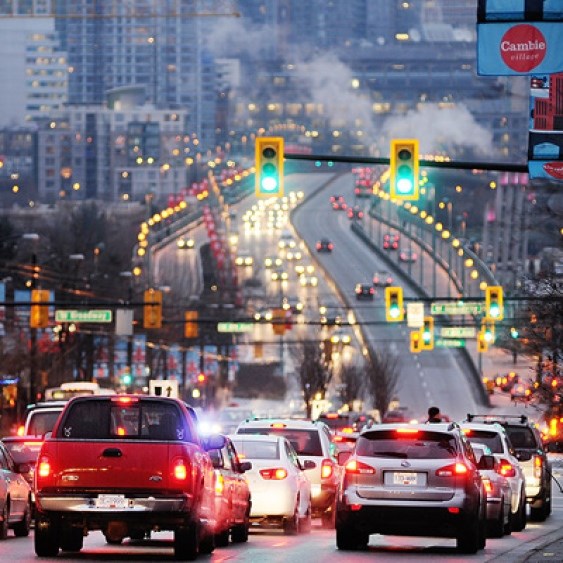Feeling a bit congested? It may not be an early winter cold. It could be the traffic.
As you may have heard, according to GPS maker TomTom we are living in the most congested city in North America. While Vancouver has headed that list for Canadian cities in the first three years of the survey, this year we have the dubious distinction of pulling ahead of Los Angeles as number one on the continent.
But somethings never change. While our congestion gets relatively worse, we are no closer to getting relief. That would mean solving the problem of sustainable funding for public transit and TransLink.
The referendum on transit financing promised (threatened) by Christy Clark during the last provincial election still has about it several serious unknowns not the least of which is: What is the wording of the question that will be put to regional voters? We also don’t know who will lead the campaign, let alone who will fund it. And, finally, we do not know when this referendum will take place.
As you can imagine regional mayors are twitchy about having this undoubtedly controversial referendum exercise happening, if it must happen, at the same time they are attempting to get re-elected next year. One thing that irks those mayors, among others, is the fact that the province seems to be able to fund massive infrastructure projects such as the Port Mann Bridge and a replacement for the Massey Tunnel without a referendum.
Those same mayors are still being pressed by the more militant among them — the mayors of Burnaby, Delta and Richmond I am told — to abandon the impotent Mayors’ Council that is supposed to oversee TransLink and hand the mess back to Victoria.
Twice in the past few weeks they have been presented with a motion to bail on the whole process only to defer it.
TransLink’s funding problems are not new, of course. It is almost four years to the day that Tom Prendergast upped and left his job as TransLink CEO for a more lucrative gig in his hometown of New York to run the transit system there. At the time, we noted his frustration here at TransLink’s failure to convince the province to provide the regional transit authority with a sustainable revenue source for operations and capital expenditures. Back then
TransLink needed an additional $260 million a year to maintain the existing service levels. Now it wants billions for infrastructure.
The challenges that drove Prendergast back home still exist and have only worsened as was clear when he turned up here a couple of weeks ago along with 500 conference delegates from business and government to discuss the importance of transit to the economy.
The two mayors most intent on landing major transit infrastructure projects for their municipalities are Vancouver’s Gregor Robertson who wants a subway along the Broadway corridor and Surrey’s Dianne Watts who is looking for a pile of dough for a light rail system.
Watts reportedly reminded the delegates at the conference that the traffic congestion in this famously most congested region on the continent is costing the provincial economy $1.5 billion annually.
As for the referendum, there is a small industry supported by transit authorities and academics alike looking at transit referenda over the past several decades to try and figure out why they succeed or fail.
One of the earliest failures examined was in Atlanta in 1968. Unions and property owners were opposed to a plan that was unclear in terms of the mode of transit being planned. The campaign did not involve locals and was poorly done. And in the end the vote over a number of areas in the region was not looked as one total but was divided up by what appeared to be different municipalities. All needed a majority.
Not all referenda fail, but it is not uncommon to see a transit authority need a couple of runs at it before they win a majority.
It’s not a prospect Robertson is looking forward to. He’s on record as saying losing that referendum would simply be “disastrous.”
Either way, don’t expect that congested feeling to go away soon.
(Note: This column has been corrected since it was first posted Nov. 15.)



